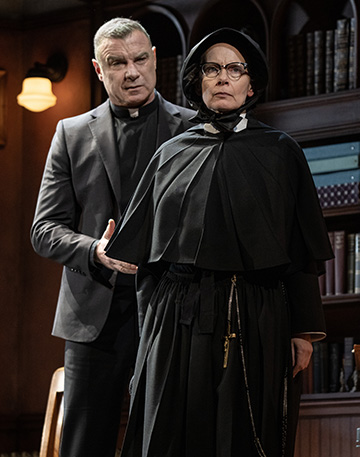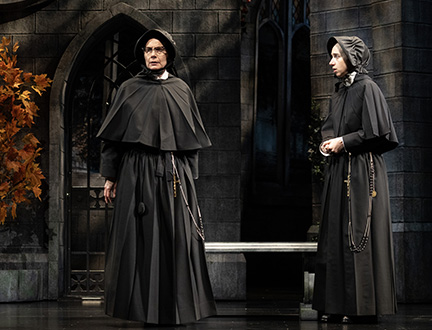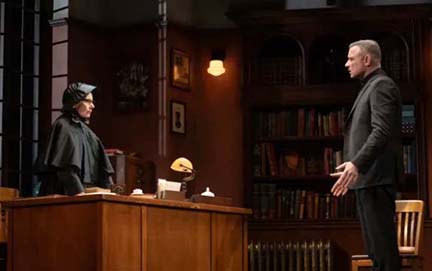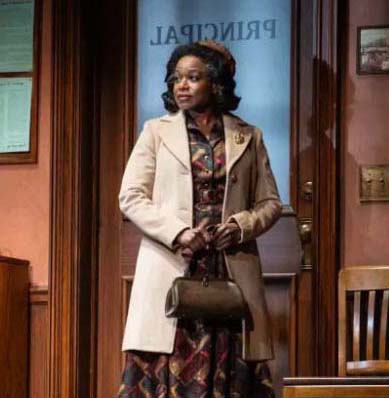By Lucy Komisar
John Patrick Shanley’s play opened in 2004, but is set forty years earlier in 1964. It deals with complex themes of suspicion, faith, and morality surrounding the possibility of child sexual abuse. The issue of pedophilia by Roman Catholic clergy in the U.S. was first publicized in 1985 when a Louisiana priest pleaded guilty to molesting boys. But even though the scandal is not raised in the play, Shanley knows that is in the minds of the audience.
There is no hint that Father Brendan Flynn (an excellent Liev Schreiber) is abusive. He is warm, sensitive, kind, nothing devious. The villain is the headmistress Sister Aloysius (an equally good Amy Ryan), a tough and unyielding woman who became a nun after her husband died in World War II some two decades earlier.
The clash of ideologies and personalities drives the narrative. Their Brooklyn accents in this Bronx Catholic school is all they have in common. She is as tough as a drill sergeant toward her charges. Her church philosophy is knuckles-rapping. Father Flynn gives a sermon against intolerance. One thinks that Shanley, a Catholic, is remembering nastiness at a parochial school he attended.
The drama revolves around a new boy, a “Negro.” (Race words would change later. Even his mother says “colored.”) He serves as an altar boy.
The nervous, uncertain Sister James (the fine Zoe Kazan), a teacher, reports she smelled alcohol on the boy’s breath. The two nuns assume he drank wine in the sacristy. (Suspend belief: one glass would hardly foul his breath. He would have to have drunk the whole bottle. And be under the table.)
Sister Aloysius, the drill sergeant, immediately decides, with no evidence, that Father Flynn gave wine to him as part of a seduction.
Sister Aloysius and Father Flynn have it out. [I find it interesting the nuns are called by their first names, the priests by their family names.] Flynn: “I’m not answerable to you, talk to Msgr Benedict.” But she burnishes her sense of honor by insisting she has to go through correct channels.
The boy’s mother (the perfectly cast Quincy Tyler Bernstine) is summoned. She pleads that the boy depends on being in the class. It is his chance to avoid a dangerous neighborhood and get into a good high school.
Then there is (maybe) a red herring. Aloysius tells Flynn she has checked out his prior postings and talked to a nun. We learn no more. The matter will be settled, though not to Sister Aloysius’s satisfaction. A parable is a simple story illustrating a moral or religious lesson. She will harbor doubts about the events, and so will the audience, which should consider the lesson. Maybe justice won.
Scott Ellis’s direction is taut in this exploration of the complexities of human nature, institutional power dynamics and moral ambiguity. The set by David Rockwell of gray church walls, with red autumn leaves reminding us about nature, and a pine-paneled interior is smart. A very fine revival.
“Doubt, a Parable.” Written by John Patrick Shanley, directed by Scott Ellis. Todd Haimes Theatre, 227 West 42nd Street, NYC bet 7th and 8th Aves. Runtime 90min. Tkts. (212) 719-1300. Opened March 7, closes April 21, 2024.





